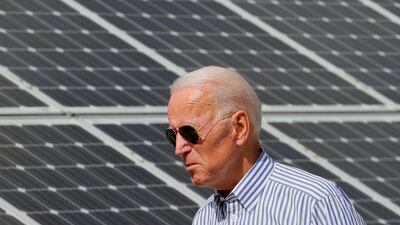President Joe Biden will take executive action to boost the US solar sector, seeking to revive clean energy projects stalled by a trade dispute and bolster domestic manufacturing to reduce the reliance of the nation’s climate efforts on foreign suppliers.
Mr Biden plans to invoke the Defence Production Act to provide support for US-made solar panels, said sources. A public announcement expected as soon as Monday.
At the same time, Mr Biden is set to announce a two-year halt in new solar tariffs, which would allow domestic project developers to continue using foreign-made equipment while US manufacturing ramps up, sources said.
The moves are aimed at boosting often-competing political priorities: combating climate change and nurturing domestic solar manufacturing that has struggled to compete with cheap imports. It is possible Mr Biden’s plan could do both in one swoop.
The White House did not immediately respond to requests for comment on details of the plans.
Mr Biden’s expected announcement caps days of brainstorming by administration officials over methods to revive clean energy projects that have been hampered by a Commerce Department trade investigation that has led some exporters to halt or slow equipment sales into the US.
“The president’s action is a much-needed reprieve from this industry-crushing probe,” said Abigail Ross Hopper, chief executive of the Solar Energy Industries Association.
“During the two-year tariff suspension window, the US solar industry can return to rapid deployment while the Defence Production Act helps grow American solar manufacturing.”
Mr Biden has come under increasing pressure to compel the production of solar panels and other clean energy technology using the Defence Production Act, the same authority wielded by President Harry Truman to make steel for the Korean War and Donald Trump to spur mask production to battle the spread of coronavirus.
The White House is also set to use the federal government’s purchasing power to help support American clean energy manufacturers, a source said.
The Commerce Department has been investigating whether some Chinese companies are circumventing decade-old tariffs by assembling solar cells and modules in Cambodia, Malaysia, Thailand and Vietnam — nations which now constitute about 80 per cent of annual panel imports into the US.
The case raised the prospect of retroactive tariffs, prompting manufacturers to halt shipments to the US and slowing solar installations. That disruption is undermining the country’s fight against climate change and Mr Biden’s efforts to pare greenhouse gas emissions from the power sector.
At least one US utility had made plans to keep a coal plant operating for longer as a result of delays to solar projects.
Yet administration officials have been steadfast that they cannot interfere with the Commerce Department investigation, which is tied to anti-dumping and countervailing duties imposed against China a decade ago to offset subsidisation and predatory pricing.
Mr Biden would not be taking action to dismiss the case, which is a quasi-judicial proceeding meant to be apolitical, said the sources.
The Commerce Department is set to issue preliminary findings in the case by late August.
One route to end the matter would be if Auxin Solar, the small California-based panel maker that instigated the probe, decides to withdraw its petition, according to trade lawyers.
Executive action under the Defence Production Act could support purchases of panels from Auxin and other domestic manufacturers.
Chinese solar panel makers gained on news of Mr Biden’s plans, with Longi Green Energy Technology shares rising by as much as 7.6 per cent in Shanghai.

